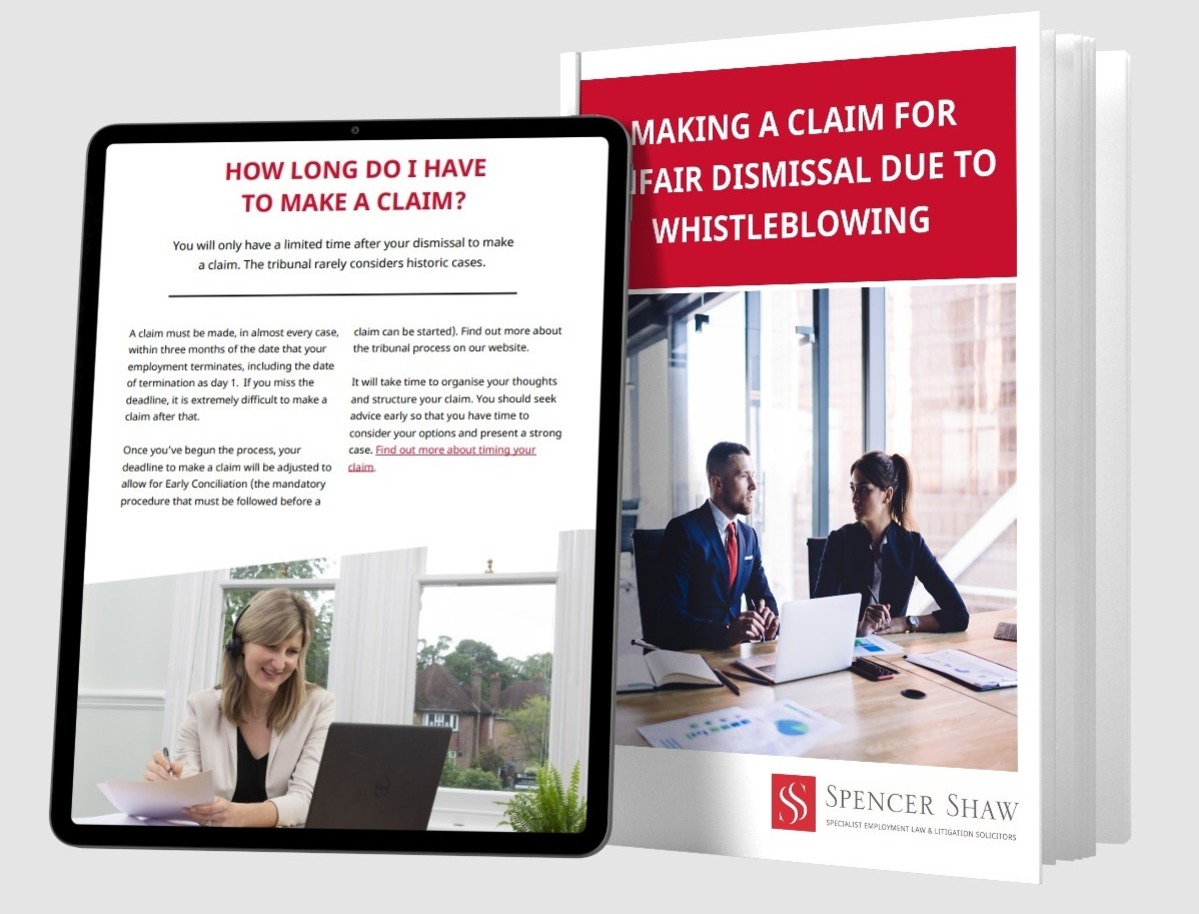WHISTLEBLOWING PROTECTION

Find out whether you have protection as a whistleblower and whether your employer has breached your rights

Protect yourself while reporting an issue

We can support you throughout your case to reduce stress and make the process clear

Clear advice in plain English - no confusing legal jargon
If your employer is doing something that you know is wrong it can be a difficult decision whether to report it. You may be worried that your employer will penalise you for speaking up, or that your working relationship will suffer. However, you might also be worried about being held responsible if you don't report the wrongdoing.
We can help you to protect yourself while making a disclosure, or to make a claim if you believe you have been dismissed or treated unfairly because of a disclosure.
NOT SURE IF YOU HAVE A CLAIM? DOWNLOAD OUR FREE GUIDE
Our guide covers the questions we get asked most often by people looking to make a claim for unfair dismissal on the basis of whistleblowing. It should help you decide your next steps.
We will never share your details without your permission

WHAT IS WHISTLEBLOWING?
The term ‘whistleblower’ refers to an employee who reports wrongdoing in their workplace which:
is listed in the Public Interest Disclosure Act 1998 (PIDA)
is in the public interest to report
You may report wrongdoing that has happened in the past, is currently happening, or that you believe will happen soon.
Employees who become 'whistleblowers' are protected under the Public Interest Disclosure Act 1998 (PIDA) from mistreatment by your employer.
You will have to show three things to claim unfair dismissal because of a protected disclosure (whistleblowing):
that you made a disclosure
that you followed the correct procedure
that you were dismissed or suffered a detriment because of making the disclosure
What types of wrongdoing are relevant to whistleblowing protection?
A criminal offence
A breach of legal obligation
A miscarriage of justice
A danger to the health and safety of any individual
Damage to the environment
Deliberate attempt to cover up any of the above.
WHO SHOULD YOU INFORM?
You can raise your concern with your employer (they may have a policy explaining the procedure you should follow). However, you do have the right to report your concern to a lawyer or to a prescribed person or body.
A prescribed person or body must be one that deals with the concerns you are raising. For example, reports of wrongdoing in a primary school can be made to Her Majesty’s Chief Inspector of Education, Children’s Services and Skills. The information you give to your employer, prescribed person or body can be done anonymously. However, if you do give your name and ask for confidentiality, your employer/prescribed person or body should adhere to that.
You should note, that if you do report your concerns to the media, in most cases you will lose your protected right.
What if I have a non-disclosure agreement (NDA)?
Non-disclosure agreements cannot overrule whistleblowing legislation, or the rights of staff to make protected disclosures.
It can sometimes be difficult to determine whether your disclosure is in the public interest and therefore benefits from whistleblowing protection. If you have any doubts about whether your complaint is whistleblowing or not, you should get in touch for legal advice.
WHAT CAN YOU EXPECT?
You can expect that your employer or prescribed person/body will listen to your concern and decide if any action needs to be taken. You won’t have any say in how the matter is to be dealt with and at this stage. Your employer or prescribed person/body may not give you much detail as they should keep the confidentiality of the others involved.
If the matter has not been dealt with to your satisfaction or is ongoing, tell someone else, such as a more senior member of staff or a prescribed person or body. You could also contact the Advisory Conciliation and Arbitration Service (ACAS), the whistleblowing charity Protect or your trade union for more direction.

GET IN TOUCH
Do you have a legal matter you'd like to discuss with us? Get in touch using the details below or use the form here and a member of our team will be in touch to discuss your enquiry.



Address: Spencer Shaw Solicitors Limited
St Mary's House, 68 Harborne Park Road,
Harborne, Birmingham, B17 0DH

Opening hours:
Monday - Friday 9:00AM - 5:00PM
Saturday, Sunday & Bank Holidays - Closed

Keep in touch




